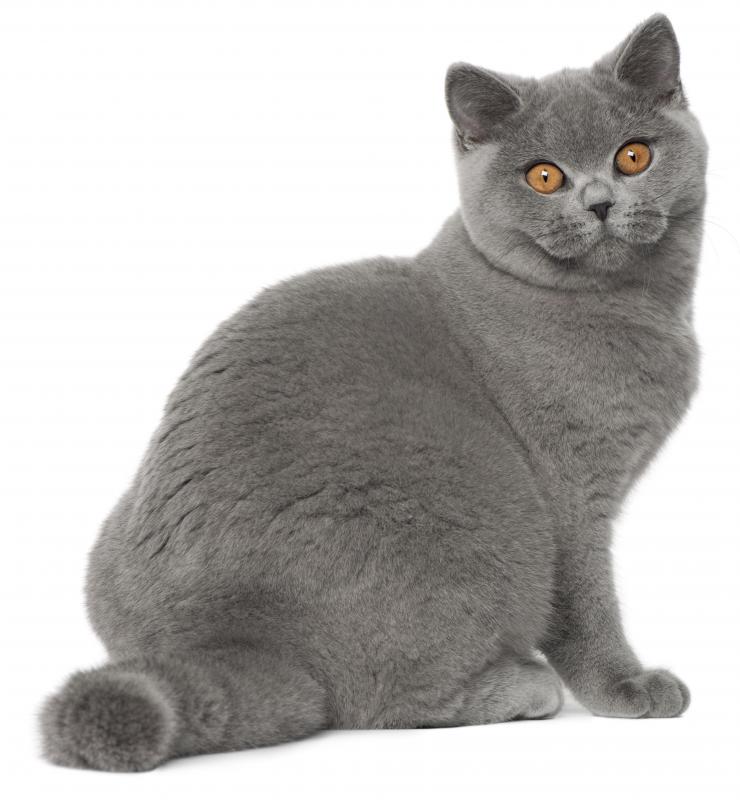At AllThingsNature, we're committed to delivering accurate, trustworthy information. Our expert-authored content is rigorously fact-checked and sourced from credible authorities. Discover how we uphold the highest standards in providing you with reliable knowledge.
What Are the Common Causes of Dry Skin in Cats?
There are many possible causes of dry skin in cats, and pet owners may want to consult a veterinarian for assistance in establishing the reason. One common cause is the change of seasons; indoor cats often experience an increase in dry skin in the colder months due to the lack of humidity in the air once heating systems are operating. Another common reason for dry skin in a cat is poor diet that is lacking in some of the vitamins and other substances that are needed for optimal skin condition. Other possible causes include allergies and excessive bathing or grooming. In some cases, dry skin can be caused by other underlying health conditions that require veterinary care.
Dry skin in cats is a fairly common problem and symptoms include scratching, licking, biting, and flaking similar to dandruff. This condition has a wide variety of possible causes. Pet owners may want to discuss the issue with a veterinarian for help figuring out the cause of the dry skin because it can be difficult to pinpoint the specific reason.

One possible cause for dry skin in cats is indoor heat during the colder months. Similar to people and dogs, cats often experience itchy dry skin when the weather is cold because there is a lack of moisture in the air. The dryness of the air is usually intensified by indoor heating systems which remove even more of the humidity. A humidifier may provide some help. It's also recommended to avoid giving the cat a bath which can dry skin further; if bathing is needed, use moisturizing shampoo and conditioner.

Another common reason cats develop dry skin is poor diet. For optimal skin condition, cats need certain levels of fatty acids and specific vitamins in their diet. Low quality food often lacks the appropriate levels of these essential nutrients. Omega-3 fatty acids are used in the cat's body for the production of health skin cells, and vitamin E also contributes to healthy skin. Switching to higher quality food or adding supplements may help ease dryness and improve the condition of the skin.

Allergies could also be a possible cause of dry skin in cats. Some typical allergies include food, fleas, dust, and other environmental irritants that can manifest themselves as dry, itchy, flaky skin in cats. Another possibility is excessive bathing which can dry out feline skin and is usually unnecessary because cats are typically clean animals who groom fastidiously. In rare cases, dry skin can be caused by other medical problems such as kidney disease or heart problems that require professional treatment. As a result, it's a good idea to consult a veterinarian if dryness lasts more than a week.
Frequently Asked Questions
What are the primary environmental factors that cause dry skin in cats?
Environmental factors such as low humidity, especially during winter months, can lead to dry skin in cats. Indoor heating systems can exacerbate this by further reducing moisture in the air. Ensuring a cat-friendly environment with adequate humidity levels can help prevent skin dryness.
Can diet influence a cat's skin health?
Absolutely. A diet lacking in essential fatty acids, particularly omega-3 and omega-6, can result in dry skin in cats. These nutrients are vital for maintaining healthy skin and coat. High-quality commercial cat foods or supplements designed for skin health can provide these necessary fatty acids.
Are there any common health issues that cause dry skin in cats?
Yes, several health issues can cause dry skin in cats. These include diabetes, hyperthyroidism, and kidney disease. Parasitic infections like fleas or mites, fungal infections, and allergies can also lead to skin dryness. Regular veterinary check-ups are crucial for early detection and treatment of these conditions.
How does grooming affect a cat's skin condition?
Proper grooming is essential for maintaining a cat's skin and coat health. Over-grooming or under-grooming can both lead to dry skin. Cats that over-groom may cause irritation and dry patches, while under-grooming can lead to matting and reduced skin circulation. Regular brushing can help distribute natural oils and prevent dry skin.
Can stress contribute to a cat's dry skin?
Stress can indeed impact a cat's skin health. Cats experiencing stress may over-groom, which can strip away natural oils and lead to dryness and irritation. Providing a stable environment, along with enrichment activities, can help reduce stress and its effects on a cat's skin.
Is it important to protect cats from sun exposure?
Protecting cats from excessive sun exposure is important, as it can lead to sunburn and dry skin, particularly in white or light-colored cats with thin fur. Limiting outdoor time during peak sun hours and providing shaded areas can help prevent skin damage from UV rays.
AS FEATURED ON:
AS FEATURED ON:













Discuss this Article
Post your comments